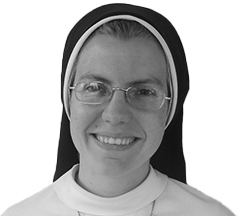Around this time during Lent, we celebrate two solemnities: St. Joseph, the husband of Mary (March 19) and the Annunciation (March 25). We take a break from the seriousness and penitence of Lent to rejoice and feast. Particularly in the convent, there is quite a noticeable contrast from Lent one day to solemnity the next.
The mix of both fasting and feasting has always been an important part of the life of the Church. We sinners know the need to express sorrow for and repentance from our sins. But we also recognize the need to rejoice in the Lord for all that He has done for us, especially for the salvation which He has wrought for us. We must have both.
I am reminded of King David’s penitence after his sin with Bathsheba. The child they conceived became ill. David fasted and prayed night and day, refusing to eat, until the child died. After the child’s death, David rose, washed, and sat down for a meal. His servants, confused as to his behavior, expecting grief over the child’s death, questioned him. David answered that while the child was living, he prayed for him to be made well, but now that the child was dead, he no longer needed to fast for him, as he would not now be saved. David understood well that there is “a time for weeping, and a time for rejoicing” (cf. Ecclesiastes 3:4).
Jesus also understood — and lived — these two human needs. Fasting in the desert for 40 days, He feasted with repentant sinners. Preparing us for the banquet feast of heaven, He would not “drink the fruit of the vine, until [He] drink[s] it new in the Father’s Kingdom” (Matthew 26:29).
To those who questioned why His disciples did not fast as did the Pharisees and John the Baptist’s disciples did, Jesus answered, “Can the wedding guests mourn when the Bridegroom is with them? The days will come when the Bridegroom is taken away from them, and then they will fast” (Matthew 9:15). So do we, whose sins have caused the death of Christ the Bridegroom, fast in penitence and contrition for our sins. But so do we also, who have the Bridegroom still living among us in the Holy Eucharist, rejoice and exult in our God.
During Morning Prayer of the Liturgy of the Hours on Sundays during Lent, we are reminded, “Today is holy to the Lord your God … Do not be saddened this day, for rejoicing in the Lord must be your strength” (Jeremiah 8:10b). Each week, right in the midst of our fasting, we are reminded to rejoice.
And perhaps, in fact, our fasting itself can be a cause for rejoicing. If our Lenten penances truly lead us closer to God, freeing us from sin and thus opening us more to His love, then we will be filled with the supernatural joy of the Lord. Our joy will be more real and more substantial once we have recognized again through fasting our need to depend totally on Him. May both our fasting and our feasting this season lead us to a lasting and joyful union with Him.
Sr. Mary Martha Becnel is a member of the Ann Arbor-based Dominican Sisters of Mary, Mother of the Eucharist.










